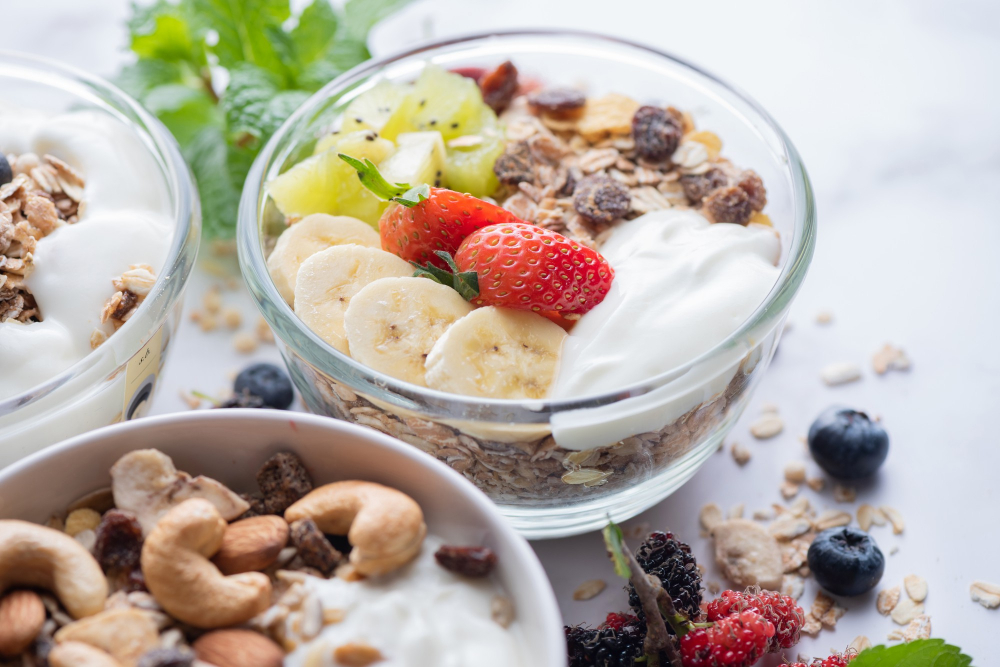
As environmental awareness grows, consumers increasingly seek sustainable and healthy snack options to benefit both their well-being and the planet. This rising interest in eco-friendly food choices has driven a demand for products that align with these values. In this article, we'll delve into the connection between sustainability and nutritious, wholesome treats, emphasizing the significance of making environmentally conscious decisions to satisfy our cravings.
The environmental impact of your food choices
Our food selections have considerable implications for the environment. From resource consumption during production to packaging materials, each stage of the supply chain adds to our ecological footprint. By opting for snacks crafted from sustainably sourced ingredients and minimal packaging, we contribute to a healthier planet.
The importance of using more ecologically sound ingredients
Selecting environmentally friendly and nutritious snacks relies heavily on being more discerning about the ingredients used in their manufacture. We must prioritize products made from whole, minimally processed foods that offer essential nutrients and come from responsible sources. Consider the following examples:
- Organic fruits, vegetables, and meats: Organically grown produce avoids synthetic pesticides, fertilizers, and feeds. This goes a long way in reducing soil and water pollution. Additionally, natural farming practices often encourage biodiversity and more robust ecosystems.
- Plant-based proteins: Supplement your animal-based proteins with plant-derived protein sources, such as legumes, nuts, and seeds, in order to decrease your environmental impact. Including these ingredients in your snacks aids in reducing greenhouse gas emissions and preserving precious resources like water and land.
- Whole grains: Nutrient-rich whole grains, including quinoa, brown rice, and oats, provide sustained energy and require fewer resources for cultivation than refined grains. This makes them an eco-friendlier choice.
Sustainable agriculture and snack production
Sustainable agriculture operations are crucial for ensuring the long-term health of our food system. Focusing on resource conservation, biodiversity promotion, and pollution reduction, these contribute to more robust ecosystems as well as responsible food production.
Examples include crop rotation, integrated pest management, and reduced tillage. When choosing snacks, ensure that you seek brands that obtain ingredients from farms employing these practices.
Packaging and waste reduction: Diminishing our environmental footprint
Beyond ingredients, snack packaging significantly contributes to a product's environmental impact. Search for minimal or earth-nurturing packaging options, such as recyclable or compostable materials. Decreasing waste generated by our food selections helps lessen pollution and energy consumption tied to waste management.
Supporting local and regenerative food systems
Backing local food systems and companies committed to sustainability fosters a greener food industry. Purchasing from nearby producers minimizes the carbon footprint linked to transportation while bolstering local economies and communities.
As such, when shopping for snacks or snack ingredients, lean towards brands like Buddig that emphasize resource efficiency throughout their processes, from ingredient sourcing to manufacturing.
Practical tips for selecting sustainable and healthy snacks
To simplify the process of finding snacks that benefit your health and the environment, keep the following tips in mind:
- Examine labels: Carefully read product labels to identify certifications that indicate a commitment to specific environmental and social standards. These include “organic,” “non-GMO,” and “fair trade.” Organic certification ensures that the ingredients are grown without synthetic pesticides and fertilizers. On the other hand, non-GMO verifies that the product does not contain genetically modified organisms. Lastly, fair trade certification guarantees that producers receive fair compensation and adhere to ethical labor practices.
- Emphasize whole foods: Opt for snacks composed of whole, minimally processed ingredients that deliver essential nutrients and have a lower environmental impact. Whole foods like fruits, vegetables, and nuts provide vitamins, minerals, and antioxidants necessary to support overall health. Additionally, these typically require fewer resources for production and processing, contributing to a more sustainable food system.
- Reduce packaging waste: The production and disposal of food packaging materials, such as plastics and metals, release greenhouse gasses and contribute to climate change. Additionally, they can also harm wildlife and contaminate waterways. Thus, it’s essential to choose products featuring minimal or more carbon-neutral packaging to lessen waste and pollution. Examples include recyclable or compostable materials, which can be easily disposed of without causing harm to the environment. By choosing products featuring sustainable packaging, you can help actively reduce the amount of plastic disposable that finds its way into landfills and oceans.
- Champion “green” companies: Support snack companies that emphasize sustainability in their operations and contribute to a more ecologically sound food system. These may prioritize ethical sourcing of ingredients, energy-efficient manufacturing processes, and waste reduction initiatives. By purchasing snacks from such businesses, you can use your consumer power to drive positive change in the food industry and encourage more environmentally responsible practices.
Final thoughts
Nurturing our bodies and the planet requires conscious decisions about the snacks we eat. As consumers, our purchasing power can drive change in the food industry by supporting companies prioritizing sustainability and providing wholesome, nutritious, and eco-conscious products. Collectively, our efforts have the power to foster positive transformations and contribute to a thriving future for all.
You may also like
Ways to Beat All the Extra Skin After Weight Loss
Top Tips For Losing Fat Without Losing Muscle
4 Organic Meal Ideas to Fit Your Healthy Lifestyle
7 Science-Backed Tips to Help Manage Your Metabolic Health
